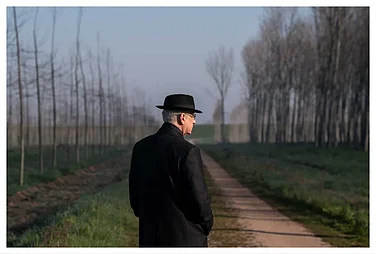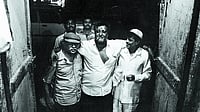

Baba (Rajnikanth) jabs a knife and utters his punchline: 'Baba counting starts. 1..2.. 3." Before the count of 10, if the enemy picks the specially-designed khukri and hands it over to Baba, he earns Baba's wrath. If Rajni picks the knife after the count, then the enemy can negotiate peace. The film is one such threat to the public—Rajni's friend-as-enemy. Accept my film, or else. (I'll enter politics?). So, the 'Baba counting' has begun.
Baba is a bizarre film. An ageing couple, which has lost hope of producing a child, is blessed with one by seven rishis who come visiting from seven sacred places. The child is a divine offering of a Baba who settled in the Himalayas some 2000 years ago. The child will not know this until his horoscope reaches a certain configuration. A song informs us: 'There are thousand surprises hidden in Baba's horoscope.'
In the first half, a jaded Rajni, who has lost a lot of weight and looks sickly, ambles his way through trite situations. Baba smokes, drinks, eats meat even on 'auspicious days', and is an atheist. Chamundeswari (a rotund Manisha Koirala) moves into the neighbourhood and starts doing aerobics on the rooftop with her sisters. Baba tells her that if women want to get some exercise they should stick to domestic labour: rangoli, sweeping the house, washing clothes, and not show off their bodies. But then, he has a crush on her. One day, a madman takes Baba away from the world of illusion to the real one: the Himalayas (shot in the Swiss Alps). There, the Eternal Baba reveals himself as a body of light under a banyan tree. He says he's initiated Jesus Christ, Adi Sankara and Kabir. He gives Baba a secret mantra, which he could use seven times. Baba fritters away the mantra five times on cheap, worldly desires. Finally, cured of his desire for meat, drink, women, he wakes up and fixes some corrupt politicians who hire a tantrik (Amrish Puri) to scuttle Baba's miracles, and nominates an old celibate as the chief minister.
The script and story are credited to Rajnikanth. Judged by Rajni's own brand of films, Baba disappoints. His 1985 biopic Raghavendrar on the Brahmin saint of Mantralaya followed the realist mode and failed. Baba tries to fuse the Rajni formula with spirituality and politics, but flops. A.R. Rahman's music and lyrics by Vairamuthu and Vaali give a certain socio-political tempo, but the film fails to translate this into action. One could find allusions to contemporary politics in Rajni films post-1992, but the star now seems to say that he does not need a real context to do politics. Whatever the politics, Baba is bad cinema. But if you are in Tamil Nadu, you better watch it.


























